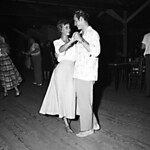State of North Carolina Popular Dance: Shagging
by Steven Case and Amy Kemp, 2017.
NC Government & Heritage Library.
See also: North Carolina State Symbols and Official Adoptions main page; Shag Dancing; State Folk Dance
The General Assembly of 2005 adopted Clogging as the official folk dance, and Shagging as the official popular dance.
Selection as State Popular Dance
The appointment of state dance has been in contention in the North Carolina legislature since 1987, when Rep. David Redwine of Brunswick county submitted a bill to name Shagging the state dance, even going so far as to demonstrate the three-step to his legislative subcommittee. The movement failed, largely due to opposition from other dance factions. Three-dance bills (Shagging as state beach dance, Clogging as state folk dance, and Square Dance as American folk dance) were introduced in 1993, 1995, and 1997 but at the time it was reported that the lawmakers wanted to spend their time on ‘weightier matters.’ A separate bill was also introduced in 1997 to make Square dancing the official state dance, and supporters hoped to have it passed in time for Charlotte to host the 47th annual National Square Dance Convention in 1998. Once again, the bill failed.
The issue again appeared in 2005, when Senator Walter Dalton of Rutherfordton urged the North Carolina senate to reclaim its heritage by adopting the shag as the state dance in retaliation of South Carolina doing similarly in 1984. Dalton accused South Carolina of making millions of dollars by stealing North Carolina’s historical dance and openly declared ‘war’ on South Carolina’s legislature. The bill, which also included clogging as the state folk dance, was passed 47 to 1 in the Senate and 101 to 7 in the House of Representatives.
About the Shag
The Shag is of much more recent origin, being a type of swing dance that developed in the 1930's and 40's. Shagging, combining nimble footwork with upbeat rhythm and blues (known as Beach music) originated at open air beach parties on the North and South Carolina coasts, and is also the official dance for the State of South Carolina. For more information, see Shag Dancing.
Slideshow from the NC State Archives Flickr photos, online at: https://www.flickr.com/photos/north-carolina-state-archives/sets/72157626629847188/
North Carolina Session Laws
Excerpt from SESSION LAW 2005-218
SENATE BILL 128
AN ACT ADOPTING OFFICIAL STATE DANCES.
Whereas, clogging and shagging are popular dances that have entertained both participants and spectators in this State for decades; and
Whereas, the shag is a form of swing dancing that evolved from the jitterbug and jump blues of the big band jazz era and originated at Carolina Beach during the 1940s; and
Whereas, the shag is most often associated with beach music, which refers to songs that are rhythm and blues based and, according to Bo Bryan, a noted shag historian and resident of Beaufort County, is a term that was coined at Carolina Beach; and
Whereas, rhythm and blues groups, such as Jimmy Cavallo and the Houserockers, bolstered the popularity of the shag during the 1940s when they performed in Fayetteville, White Lake, and other areas around the State; and
Whereas, today, the shag is a recognized dance in national and international dance competitions held across the United States; and
Whereas, North Carolina is home to some of the most successful national shag champions, including multiple championship title winners, including Charlie Womble, Jackie McGee, Michael Norris, LeAnn Best, and Sam and Sarah West; and
Whereas, North Carolina natives Clarice Reavis of Fayetteville and Harry Driver of Dunn are recognized as Queen of Shag and Father of Shag respectively; and
Whereas, numerous North Carolinians have been inducted into the Shaggers Hall of Fame; and
Whereas, North Carolina has the most beach music clubs in the nation and has a number of radio stations that depend solely upon the listenership of shag enthusiasts; and
Whereas, it is fitting to adopt clogging and shagging as official State dances; Now, therefore,
The General Assembly of North Carolina enacts:
SECTION 1. Chapter 145 of the General Statutes is amended by adding a new section to read:
"§ 145-24. Official State dances.
(a) Clogging is adopted as the official folk dance of North Carolina.
(b) Shagging is adopted as the official popular dance of North Carolina."
SECTION 2. This act is effective when it becomes law.
In the General Assembly read three times and ratified this the 13th day of July, 2005.
s/ Beverly E. Perdue
President of the Senate
s/ James B. Black
Speaker of the House of Representatives
s/ Michael F. Easley
Governor
Approved 2:06 p.m. this 20th day of July, 2005
References and additional resources:
National Shag Dance Championships: https://shagnationals.com/
Binker, Mark. "Shagging, Clogging 1 Step from Passage - The Two Dances Face One Last Vote in the Senate Before they can Gain the State's Seal of ''Official.''," Greensboro News & Record (NC), July 10, 2005: B1.
Binker, Mark. "It's War!," News & Record: Blogs (Greensboro, NC), April 27, 2005.
Rhee, Foon. "Official N.C. Dance Step: Is it Square? Shag? Clog?," Charlotte Observer, The (NC), March 28, 1997: 1C.
Rice, David and David Ingram. "Clogging, Shagging Voted Official State Dances by Significant Margin," Winston-Salem Journal (NC), July 10, 2005: 2.
"Political Notes; Legislators: May we have this Dance?," Star-News (Wilmington, NC), April 17, 1995: 1B.
"Boppin' at the Beach," Our State, May 2007. https://digital.ncdcr.gov/Documents/Detail/our-state/1107747?item=1107847
1 June 2007 | Case, Steven; Kemp, Amy
